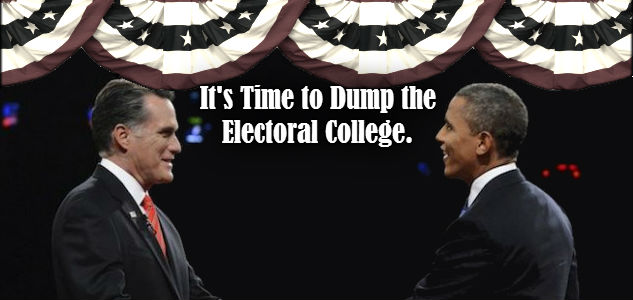
More states could drop Electoral College waiting to gain majority of states before implementation | Democracy, elections, and voting at Democracy Chronicles
National Popular Vote Movement Lands in Connecticut, Again: Avon Patch
Gov. Malloy says Connecticut should join the nine other states that have already signed on to do away with the Electoral College. State legislators are once again talking about how to elect the President of the United States. And the conversation is? Drop Electoral College? Your thoughts below…
mvy says
National Popular Vote does not “do away with,” “drop,” or “dump” the Electoral College.
The Electoral College would not be a thing of the past.
The National Popular Vote bill would replace state winner-take-all statutes that award all of a state’s electoral votes to the candidate who get the most popular votes in each separate state (not mentioned in the U.S. Constitution, but since enacted by 48 states), to a system guaranteeing the majority of Electoral College votes for, and the Presidency to, the candidate getting the most popular votes in the entire United States.
The bill preserves the constitutionally mandated Electoral College and state control of elections. It ensures that every voter is equal, every voter will matter, in every state, in every presidential election, and the candidate with the most votes wins, as in virtually every other election in the country.
Under National Popular Vote, every voter, everywhere, would be politically relevant and equal in every presidential election. Every vote would be included in the state counts and national count.
When states with a combined total of at least 270 electoral votes enact the bill, the candidate with the most popular votes in all 50 states and DC would get the needed majority of 270+ Electoral College votes from the enacting states. The bill would thus guarantee the Presidency to the candidate who receives the most popular votes.
The bill has passed 33 state legislative chambers in 22 rural, small, medium, and large states with 250 electoral votes. The bill has been enacted by 10 jurisdictions with 136 electoral votes – 50.4% of the 270 necessary to go into effect.
NationalPopularVote
Follow National Popular Vote on Facebook via NationalPopularVoteInc
Adrian Tawfik says
Great point. There would still be an Electoral College after all. I like the idea as you describe it. Good luck!
mvy says
In Gallup polls since 1944, only about 20% of the public has supported the current system of awarding all of a state’s electoral votes to the presidential candidate who receives the most votes in each separate state (with about 70% opposed and about 10% undecided).
Support for a national popular vote is strong among Republicans, Democrats, and Independent voters, as well as every demographic group in virtually every state surveyed in recent polls
in recent or past closely divided Battleground states: CO – 68%, FL – 78%, IA –75%, MI – 73%, MO – 70%, NH – 69%, NV – 72%, NM– 76%, NC – 74%, OH – 70%, PA – 78%, VA – 74%, and WI – 71%;
in Small states (3 to 5 electoral votes): AK – 70%, DC – 76%, DE – 75%, ID – 77%, ME – 77%, MT – 72%, NE 74%, NH – 69%, NV – 72%, NM – 76%, OK – 81%, RI – 74%, SD – 71%, UT – 70%, VT – 75%, WV – 81%, and WY – 69%;
in Southern and Border states: AR – 80%, KY- 80%, MS – 77%, MO – 70%, NC – 74%, OK – 81%, SC – 71%, TN – 83%, VA – 74%, and WV – 81%; and
in other states polled: AZ – 67%, CA – 70%, CT – 74%, MA – 73%, MN – 75%, NY – 79%, OR – 76%, and WA – 77%.
Americans believe that the candidate who receives the most votes should win.
NationalPopularVote
mvy says
·
In a survey of Connecticut voters, there was 74% overall support
for the idea that the President of the United States should be the candidate
who receives the most popular votes in all 50 states. Voters were asked:
“How do you think we should elect the President: Should it be the candidate who
gets the most votes in all 50 states, or the current Electoral College system?”
Support by political affiliation, was 80% among Democrats, 67% among
Republicans, and 71% among others.
By gender, support was 81% among women and 66% among men.
By age, support was 82% among 18-29 year olds, 69% among 30-45 year olds, 75%
among 46-65 year olds, and 72% for those older than 65.
NationalPopularVote